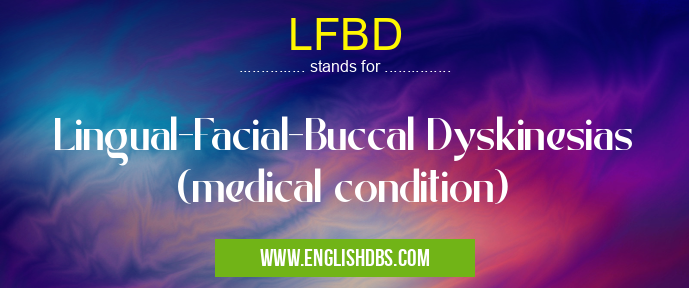What does LFBD mean in MEDICAL
LFBD stands for Lingual-Facial-Buccal Dyskinesias. It refers to a group of involuntary movements that affect the tongue, face, and inside of the cheeks. These movements can range from mild twitches to severe muscle spasms. LFBD is a neurological condition commonly associated with the long-term use of certain medications, such as antipsychotics.

LFBD meaning in Medical in Medical
LFBD mostly used in an acronym Medical in Category Medical that means Lingual-Facial-Buccal Dyskinesias (medical condition)
Shorthand: LFBD,
Full Form: Lingual-Facial-Buccal Dyskinesias (medical condition)
For more information of "Lingual-Facial-Buccal Dyskinesias (medical condition)", see the section below.
LFBD: Definition and Medical Significance
Causes of LFBD
LFBD is primarily caused by prolonged exposure to antipsychotic medications, particularly those that block dopamine receptors in the brain. These medications are used to treat conditions such as schizophrenia and bipolar disorder. Other potential causes of LFBD include:
- Brain injury
- Stroke
- Huntington's disease
- Parkinson's disease
- Certain genetic disorders
Symptoms of LFBD
The symptoms of LFBD can vary in severity and duration. Common symptoms include:
- Lingual dyskinesia: Involuntary movements of the tongue, such as protrusion, retraction, or side-to-side movements.
- Facial dyskinesia: Involuntary movements of the face, such as grimacing, blinking, or frowning.
- Buccal dyskinesia: Involuntary movements of the inside of the cheeks, such as chewing or sucking motions.
Diagnosis of LFBD
LFBD is typically diagnosed based on a physical examination and the patient's medication history. The doctor may also order imaging tests, such as an MRI, to rule out other potential causes of the involuntary movements.
Treatment Options
The primary treatment for LFBD involves reducing or discontinuing the medication that is causing the condition. In some cases, alternative medications or lower doses may be prescribed. Other treatment options may include:
- Botulinum toxin injections: Injections of botulinum toxin can temporarily paralyze the affected muscles, reducing involuntary movements.
- Deep brain stimulation: This surgical procedure involves implanting a device that sends electrical impulses to the brain, which can help regulate muscle movement.
Conclusion
LFBD is a neurological condition that can significantly impact an individual's quality of life. Understanding the causes, symptoms, and treatment options for LFBD is crucial for healthcare professionals and patients alike. By working together, they can effectively manage the condition and improve the patient's overall well-being.
Essential Questions and Answers on Lingual-Facial-Buccal Dyskinesias (medical condition) in "MEDICAL»MEDICAL"
What are Lingual-Facial-Buccal Dyskinesias (LFBD)?
LFBD is a rare medical condition characterized by involuntary, repetitive movements of the tongue, lips, and cheeks. These movements can range from simple twitches to complex, writhing motions.
What causes LFBD?
The exact cause of LFBD is unknown, but it is thought to be related to abnormal activity in the brain's basal ganglia, which are responsible for controlling movement. LFBD can be associated with a variety of other medical conditions, including cerebral palsy, autism, and neurodegenerative diseases.
What are the symptoms of LFBD?
The symptoms of LFBD can vary depending on the severity of the condition. Common symptoms include involuntary movements of the tongue, lips, and cheeks, difficulty speaking or eating, drooling, and facial grimacing.
How is LFBD diagnosed?
LFBD is diagnosed based on a physical examination and a review of the patient's medical history. A doctor may also order imaging tests, such as an MRI, to rule out other potential causes of the symptoms.
How is LFBD treated?
There is no cure for LFBD, but there are treatments available to manage the symptoms. These treatments may include medications, such as anticholinergics or dopamine agonists, speech therapy, and physical therapy.
What is the prognosis for LFBD?
The prognosis for LFBD varies depending on the severity of the condition and the underlying cause. Some people with LFBD may experience only mild symptoms that do not significantly affect their daily life, while others may have more severe symptoms that require ongoing treatment.
Can LFBD be prevented?
LFBD cannot be prevented, but early diagnosis and treatment can help to minimize the symptoms and improve the quality of life for people with the condition.
